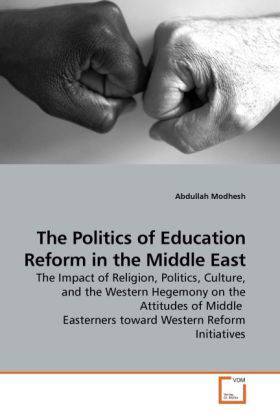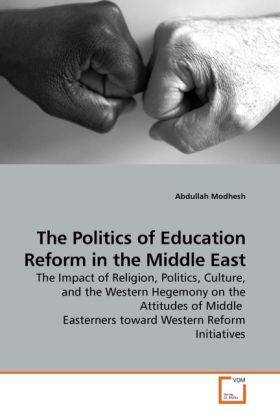
Je cadeautjes zeker op tijd in huis hebben voor de feestdagen? Kom langs in onze winkels en vind het perfecte geschenk!
- Afhalen na 1 uur in een winkel met voorraad
- Gratis thuislevering in België vanaf € 30
- Ruim aanbod met 7 miljoen producten
Je cadeautjes zeker op tijd in huis hebben voor de feestdagen? Kom langs in onze winkels en vind het perfecte geschenk!
- Afhalen na 1 uur in een winkel met voorraad
- Gratis thuislevering in België vanaf € 30
- Ruim aanbod met 7 miljoen producten
Zoeken
The Politics of Education Reform in the Middle East
The Impact of Religion, Politics, Culture, and the Western Hegemony on the Attitudes of Middle Easterners toward Western Reform Initiatives
Abdullah Modhesh
Paperback | Engels
€ 48,45
+ 96 punten
Omschrijving
After 9/11, education in the Middle East has come under increasing scrutiny. Some in the West believe education is responsible for the ideological preparation of extremists. Others think that the lack of quality education creates a pool of likely terrorists. Western demands and initiatives to reform education in the Middle East have resulted from such views and from an understanding of the development needs in the region as well. But these initiatives and demands are perceived differently in the Middle East. Middle Easterners are divided between those who view the Western initiatives favorably and those who perceive them with suspicion and even fear. This book examines the views of Yemeni educators on the need for education reform and their attitudes toward Western reform initiatives. Questions of the impact of religiosity (personal piety vs. support for political Islam), culture, and politics on their attitudes are also explored.
Specificaties
Betrokkenen
- Auteur(s):
- Uitgeverij:
Inhoud
- Aantal bladzijden:
- 104
- Taal:
- Engels
Eigenschappen
- Productcode (EAN):
- 9783639205824
- Uitvoering:
- Paperback

Alleen bij Standaard Boekhandel
+ 96 punten op je klantenkaart van Standaard Boekhandel
Beoordelingen
We publiceren alleen reviews die voldoen aan de voorwaarden voor reviews. Bekijk onze voorwaarden voor reviews.









